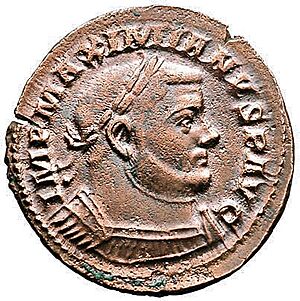290s facts for kids
| Millennium: | 1st millennium |
| Centuries: | 2nd century – 3rd century – 4th century |
| Decades: | 260s 270s 280s – 290s – 300s 310s 320s |
| Years: | 290 291 292 293 294 295 296 297 298 299 |
| Categories: | Births – Deaths – Architecture Establishments – Disestablishments |
The 290s were a ten-year period that started on January 1, 290, and ended on December 31, 299. This decade was part of the late Roman Empire, a time when the empire was very large and powerful. During these years, important leaders helped to change and strengthen the Roman Empire.
Events
290
291
292
293
294
295
296
297
298
299
Key Leaders of the 290s
Emperor Diocletian's Rule
One of the most important people during the 290s was Diocletian. He was the Roman Emperor and started ruling in 284 AD. Diocletian is famous for making big changes to how the Roman Empire was run. He realized the empire was too big for one person to manage alone.
The Tetrarchy System
To make the empire easier to govern, Diocletian created a new system called the Tetrarchy. This word means "rule by four." He divided the empire into two main parts: the East and the West. Then, he appointed two senior emperors, called Augusti, and two junior emperors, called Caesars. Each of these four leaders was responsible for a different part of the empire. This system helped to bring more stability and better defense to the vast Roman lands.
Maximian: Diocletian's Co-Emperor
Another key leader of this decade was Maximian. Diocletian chose Maximian to be his co-emperor, or Augustus, in the western part of the Roman Empire. Maximian was a skilled military leader. He helped Diocletian defend the empire's borders and put down rebellions. Together, Diocletian and Maximian worked to restore order and strength to the Roman Empire after a period of trouble. Their partnership was a big part of the Tetrarchy system.
What Else Happened?
During the 290s, the Roman Empire focused on rebuilding and securing its borders. There were military campaigns to protect against invasions from different groups. The new system of having four emperors helped to manage these challenges more effectively across the huge empire. This decade was a time of important changes that shaped the future of the Roman Empire.
See also
 In Spanish: Años 290 para niños
In Spanish: Años 290 para niños
 | Precious Adams |
 | Lauren Anderson |
 | Janet Collins |


